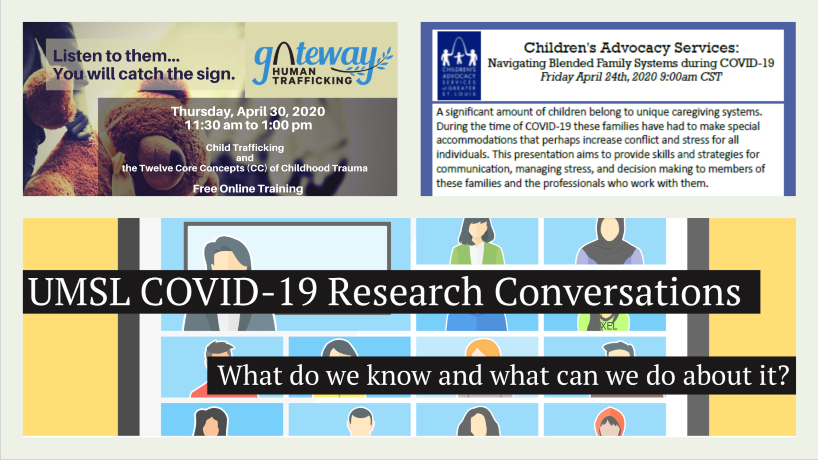
The Department of Sociology partnered with Gateway Human Trafficking and the Community and Children’s Resource Board of St. Charles County to provide training and information on child trafficking in the St. Louis region (top left). The Children’s Advocacy Center hosted a webinar geared toward service providers, offering tips for supporting clients with blended families (top right). The Office of Research Administration hosted a discussion of gun violence and suicide during COVID-19, focusing on the need for up-to-date statistics.
An integral part of the University of Missouri–St. Louis’ mission is making a positive impact on the community around it.
During COVID-19, the university’s focus has not changed. However, the ways in which it supports the community have been altered.
In-person presentations, events and trainings are now held online, on topics specific to the coronavirus pandemic. As the virus affects nearly every aspect of daily life, the list of issues to explore is vast.
The Children’s Advocacy Center, Department of Sociology and Office of Research Administration hosted webinars over the last two weeks to support community members and professionals. Topics included tips for blended families navigating the crisis, a discussion of child trafficking and how COVID-19 is impacting gun violence and suicide rates.
“Navigating Blended Family Systems During COVID-19”
Stay-at-home orders and social distancing requirements are creating unique challenges for blended families – units that include co-parents, more than one generation or caregivers other than parents.
An April 24 Zoom and YouTube webinar by the Children’s Advocacy Services of Greater St. Louis discussed how families can address these challenges and how service providers can best support families. CAS mental health professionals Alejandra Martinez and Kiarra Charles guided attendees through ways to encourage caregivers to advocate for themselves and their children.
Due to COVID-19, many blended families have to consider how to navigate transitions between parents, possible financial strain and a lack of resources such as schools and day cares. Charles stressed the importance of prioritizing clients’ physical and psychological safety and trying to anticipate and prevent issues that may affect families.
“This is pulling on us for some new tools, some new resources,” Charles said. “Maybe not completely revamped, but definitely approaching the work in a different way that best suits the situation we have right now.”
Martinez discussed how providers can equip caregivers to advocate for their children by using assertive, direct communication based on effective interpersonal skills. She also explained the need for flexibility.
“Our focus isn’t trying to get the perfect solution,” Martinez said. “Our goals are instead to focus on how we enhance safety, how we take a harm-reduction approach and how we adapt to the new normal within the specific constraints of each family.”
To view the full webinar, click here.
“Child Trafficking and the Twelve Core Concepts of Childhood Trauma”
St. Louis is among the top 20 cities in the United States for human trafficking. That’s mainly due to its location on the Mississippi River and major interstates, along with the presence of an international airport and professional sports teams.
Gateway Human Trafficking, the Community and Children’s Resource Board of St. Charles County and the UMSL Department of Sociology hosted a webinar on Thursday to train law enforcement officers, social workers and other professionals on how to recognize and respond to child trafficking.
Erica Irwin, a licensed clinical social worker at the Children’s Advocacy Center, was the featured speaker, and Shima Rostami, executive director of Gateway Human Trafficking, moderated the sold-out event. Around 300 attendees participated in the training session via Zoom.
Rostami stressed that human trafficking is becoming an increasingly critical topic. Economic hardships due to the COVID-19 pandemic are making people more vulnerable to exploitation.
“Right now, we have so many people who lost their job and need to fund their family and their kids,” Rostami said. “They might be targeted by traffickers for labor trafficking due to accepting any kind of job less than the minimum wage, any circumstances. Regarding sex trafficking, people who are suffering in the short term and long term cannot afford food and shelter. They easily get targeted and recruited by traffickers.”
The webinar was fifth in a series of training sessions meant to educate local community members about human trafficking and inspire attendees to advocate for change.
“Incidence of Gun Violence and Suicide in the Midst of COVID-19”
Researchers don’t know how many suicides occurred this year or last year in Missouri. That’s because the latest data available provides information from 2018. What researchers do know is that suicide attempts that involve a firearm are 82 to 92 percent lethal.
On Friday, Liz Sale, associate research professor at the Missouri Institute of Mental Health, Katie Ellison, project director of the Safer Homes Collaborative at MIMH, and Rachel Wamser-Nanney, assistant professor of clinical psychology at UMSL, led a Zoom discussion with UMSL faculty members about how the current pandemic is affecting gun violence and suicide rates.
The webinar was second in a weekly series of conversations on topics related to COVID-19 hosted by the Office of Research Administration.
“If we think about what’s going on now, this is such a stressful event in terms of all kinds of things could happen to one person,” Sale said. “Alcohol use has gone soaring up in the past weeks. People are losing their jobs. This is such a recipe for disaster, but we don’t know what’s going to happen.”
Statistics show that the number of people utilizing the Disaster Distress Helpline and Crisis Text Line sharply increased since the start of the COVID-19 outbreak. At the same time, handgun and firearm sales nearly doubled during the last two weeks of March.
Much of the discussion focused on the need for more current data and standardized guidelines for ruling a death as a suicide. Participants explored possibilities for researching the subject across disciplines, including increased communication with the gun-owning community, exploring drivers of firearm sales and using the humanities and arts to focus on positive successes during COVID-19.














